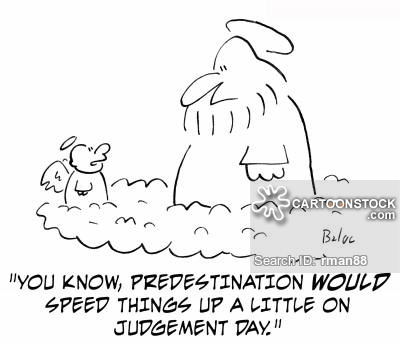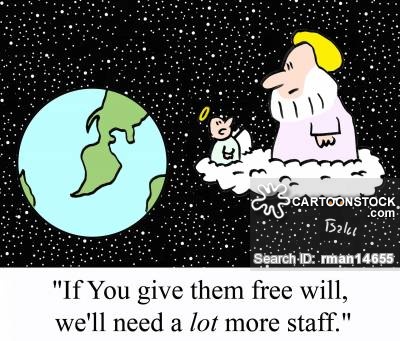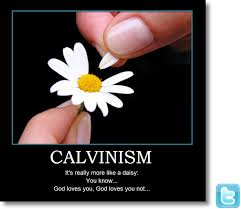Blog Archives
A VERSE TO REMEMBER:
“We have our hope set on the living God, who is the Savior of all people, especially of those who believe” (1Tim 4.10).
We can read this verse two primary ways (though there could be others): Jesus’ death justified the sins of all people (Arminian) or “all people” means only “those who believe” (Calvinist). One view emphasizes the fact that Jesus died for the sins of all (2Cor 5.21), while the other believes His sacrifice is imputed only to those who believe it to be true. But we must ask the question: is something true only because we believe it is or does a truth only affect us when we place our faith in it? Gravity is true apart from faith but faith in it keeps one grounded in reality.
DON’T BELIEVE THE SIMPLE GOSPEL (Part 9)
Pre-Positional Sanctification (Set Apart) – the election of God
 Here’s the simplified version of the Gospel many of us hear: “And you also were included in Christ when you heard the message of truth, the gospel of your salvation” (Ep 1.13). It has all the components of the simple gospel—we are sinners who need to hear the gospel and believe in Jesus Christ. Only a simple practice of Bible study will reveal that there should be so much more to our soteriology than this.
Here’s the simplified version of the Gospel many of us hear: “And you also were included in Christ when you heard the message of truth, the gospel of your salvation” (Ep 1.13). It has all the components of the simple gospel—we are sinners who need to hear the gospel and believe in Jesus Christ. Only a simple practice of Bible study will reveal that there should be so much more to our soteriology than this.
When does God save us?
Reading the context around Ephesians 1.13, we find Paul highlighting a few facts:
In Him you were also chosen, having been predestined according to the plan of Him who works out everything in conformity with the purpose of His will…. And you also were included in Christ when you heard the message of truth, the gospel of your salvation. When you believe, you were marked in Him with a seal, the promised Holy Spirit, who is our deposit guaranteeing our inheritance” (Eph 1.11-14).
 God says He “chose us” and “predestined” us to be saved. The word “proorizo,” translated here as “predestined,” derives from the word “orizo” and “pro” which means “to mark the boundaries or determine the limits” and “before,” respectively. In other words, “before” we “heard the message… believed…” and were marked by the Spirit, God “prepared beforehand” the “good works” we would perform (Eph 2.10).
God says He “chose us” and “predestined” us to be saved. The word “proorizo,” translated here as “predestined,” derives from the word “orizo” and “pro” which means “to mark the boundaries or determine the limits” and “before,” respectively. In other words, “before” we “heard the message… believed…” and were marked by the Spirit, God “prepared beforehand” the “good works” we would perform (Eph 2.10).
So when did God determine this?
“He chose us in Him before the creation of the world” (Eph 1.4).
“God, who saved us and called us to a holy calling… because of His own purpose and grace, which He gave us in Christ Jesus before time began” (2Tim 1.9).
We are saved by God’s grace, through faith, apart from any work of man because we were chosen to be saved “before creation” and “time began.” Though we are not physically born saved—because we lack the Holy Spirit—God knows those who are His before they ever “confess the Name of the Lord” (2Tim 2.19) and are baptized by God’s Spirit.
What about free will: our choice?
 “And the Lord commanded the man, ‘You are free to eat from any tree… but you must not eat from the tree of the knowledge of good and evil” (Gen 2.16, 17).
“And the Lord commanded the man, ‘You are free to eat from any tree… but you must not eat from the tree of the knowledge of good and evil” (Gen 2.16, 17).
“Those whom I love I rebuke and discipline. So be earnest and repent. Here I am! I stand at the door and knock. If anyone hears my voice and opens the door, I will come in and eat with that person” (Rev 3.19, 20).
“Work out your salvation with fear and trembling… for it is God who works in you to will and to act” (Phil 2.12, 13).
“But what does it say? ‘The word is near you; it is in your mouth and in your heart…’ For it is with your heart that you believe… and your mouth that you profess your faith and are saved” (Rom 10.8-10).
Remember that the word for predestined, “proorizo,” means “to mark the boundaries or determine the limits beforehand.” God establishes our boundaries—when we are born, to whom, what country, etc.—and the choices we make reside within those predetermined boundaries. Just as “we love because He first loved us” (1John 4.8), so we choose salvation because God chose us to be saved.
God told Adam he was “free” to eat any tree in the boundary of the garden (Gen 2). Jesus is knocking at the door of those He’s already chosen to rebuke in love granting them the opportunity to choose repentance (Rev 3; John 15.16). Paul tells us we can “work out our salvation” only because “God works in you” (Phil 2.13). And though we receive salvation through believing in our heart and professing with our mouth, it is only because God’s Word has been placed in our heart and is on the tip of our tongues through the indwelling Holy Spirit (1Cor 2; Rom 10).
In our hearts we “plan our course,” but it is, and has always been, God who “establishes our steps” (Prov 16.9).
ARE WE LIMITING THE GRACE OF GOD? part 1
1-Does the accuracy of the Gospel matter to you?
 Do you believe that God sent Jesus to die in order to save everyone from their sins? If yes, then if most go to hell, does it mean that Jesus’ death did not accomplish God’s purpose through the death of His Son? If we say they chose to go to heaven or hell, then do you believe the Potter molds the clay only as the clay directs Him (Rom 9.20-23)? On the other hand, do you believe, as the Calvinist endorse, “The atonement Christ made for the sins of His people was limited in purpose; not in its value… for it was designed for the elect of God… ‘to save His people from their sins’ (Mt. 1.21)” (http://www.gospeloutreach.net/limited_atonement.html)? In other words, do you believe God’s grace is limited to providing salvation only for those who were predetermined to be His children? Did Jesus die for everyone or only for those who believe it?
Do you believe that God sent Jesus to die in order to save everyone from their sins? If yes, then if most go to hell, does it mean that Jesus’ death did not accomplish God’s purpose through the death of His Son? If we say they chose to go to heaven or hell, then do you believe the Potter molds the clay only as the clay directs Him (Rom 9.20-23)? On the other hand, do you believe, as the Calvinist endorse, “The atonement Christ made for the sins of His people was limited in purpose; not in its value… for it was designed for the elect of God… ‘to save His people from their sins’ (Mt. 1.21)” (http://www.gospeloutreach.net/limited_atonement.html)? In other words, do you believe God’s grace is limited to providing salvation only for those who were predetermined to be His children? Did Jesus die for everyone or only for those who believe it?
The topics of grace, faith, justification, sanctification, predestination, election, and components of salvation like atonement, reconciliation, and redemption are avoided by the majority of Christians like an obese person passing by a gym. We often feel unqualified or unconcerned or are unwilling to dig into the Word to discover what God actually teaches on the subject, thinking, “Why does it matter anyway?” Little children only eat “good foods” and behave properly because their parents force them to but what happens when the kids grow up without ever learning why people should respect others or eat what won’t turn them into whales? What happens when these kids have children of their own that they must feed? Does what we believe matter then?
What if both theologies—grace is given to all and God saves only His elect—were simply two sides of the same coin? (The president’s head looks nothing like the government building, yet they represent the same coin and the front of my face looks nothing like the hair on the back, yet both form my head.) What if this were true of us: “The person who thinks he/she knows something does not yet know as he/she ought to know” (1Cor 8.2). What if God thought that “by this time [we] ought to be teachers” (Heb 5.12) and is rather perturbed that we teach a Gospel that is only half-right?
